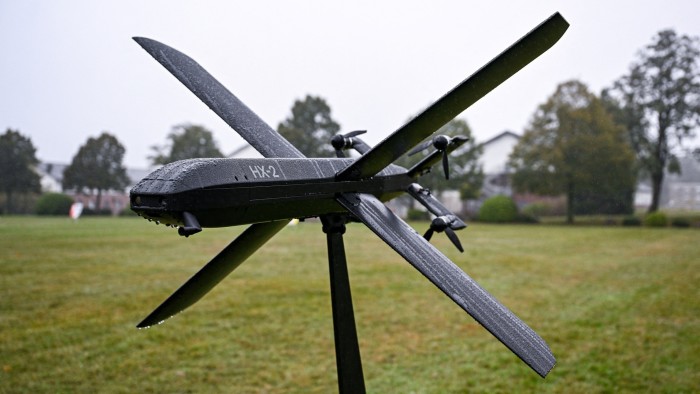Unlock the Editor’s Digest for free
Roula Khalaf, Editor of the FT, selects her favourite stories in this weekly newsletter.
Europe must rethink military procurement to keep up with the fast-changing world of drone warfare, the new boss of German start-up Stark has said.
Uwe Horstmann, who will on Thursday be announced as the 15-month-old attack drone maker’s first chief executive, welcomed calls from top western military officials to update long-standing purchasing models to reflect the pace of innovation in the sector since Russia’s 2022 full-scale invasion of Ukraine.
“When and how do we want [these drones]? How many of them? What do we do with them? Do we store them? Do we update them?” he asked in an interview with the Financial Times. That debate, Horstmann added, was “one of the keys to creating actual deterrence through industrial structure”.
Berlin-based Stark did not previously have a chief executive. In an unusual arrangement, he will remain a partner at the venture capital firm Project A, an early Stark backer, “scouting investments, contributing investment decisions or portfolio management”.
Horstmann’s appointment comes after German defence minister Boris Pistorius said on Wednesday that the country planned to invest €10bn in military drones in the coming years to help protect Nato airspace against threats from Russia.
In response to the cat-and-mouse game of innovation and counter-innovation playing out between Ukraine and Russia, Germany’s top general Carsten Breuer said last month that he could imagine new types of contracts that enabled the military to swiftly order large numbers of the latest drones.
That might be preferable to stockpiling weapons that could quickly become outdated, Breuer said.
Horstmann welcomed such discussions, but pointed to some of the challenges in a highly regulated domain that requires the certification of each new product or update: “Ideally, the software is something that we want to update every week,” he said.
Stark — whose backers include Peter Thiel, the billionaire tech investor, Joe Lonsdale, co-founder of data analytics group Palantir and head of venture capital firm 8VC, and leading Silicon Valley VC group Sequoia Capital — is one of the fastest growing drone start-ups in a rapidly proliferating sector.
The company was valued at $500mn in its last funding round, which raised $62mn, in August.
Germany’s armed forces bought a small number of Stark’s autonomous, armed Virtus drones this year, as well as some from rival Helsing, for testing purposes. Those companies are vying for an upcoming much larger contract.
Horstmann said secrecy rules meant he could not disclose any government deals: “I can tell you that we have multiple contracts, not just one.”
Stark, which has also been developing a command-and-control system called Minerva, has a team in Ukraine.
The start-up, which in July announced plans to open a UK factory in Swindon, has also faced controversy.
Stark was co-founded by former army officer Florian Seibel after investors in his reconnaissance drone start-up Quantum Systems told him that they could not allow it to make armed unmanned aerial vehicles.
It has since faced questions about whether it has maintained a firewall between the two entities. Horstmann said Seibel was a “good friend” with whom he worked well but “doesn’t have an operational role”.
Stark and Quantum, he said, were “entirely separate” with “entirely different teams”.




